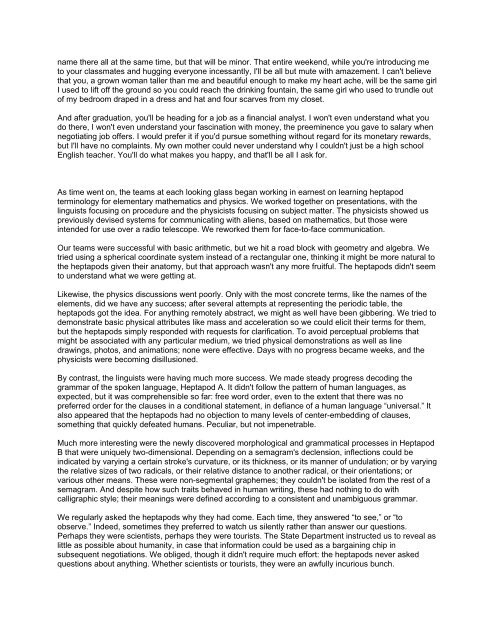Create successful ePaper yourself
Turn your PDF publications into a flip-book with our unique Google optimized e-Paper software.
name there all at the same time, but that will be minor. That entire weekend, while you're introducing me<br />
to your classmates and hugging everyone incessantly, I'll be all but mute with amazement. I can't believe<br />
that you, a grown woman taller than me and beautiful enough to make my heart ache, will be the same girl<br />
I used to lift off the ground so you could reach the drinking fountain, the same girl who used to trundle out<br />
of my bedroom draped in a dress and hat and four scarves from my closet.<br />
And after graduation, you'll be heading for a job as a financial analyst. I won't even understand what you<br />
do there, I won't even understand your fascination with money, the preeminence you gave to salary when<br />
negotiating job offers. I would prefer it if you'd pursue something without regard for its monetary rewards,<br />
but I'll have no complaints. My own mother could never understand why I couldn't just be a high school<br />
English teacher. You'll do what makes you happy, and that'll be all I ask for.<br />
As time went on, the teams at each looking glass began working in earnest on learning heptapod<br />
terminology for elementary mathematics and physics. We worked together on presentations, with the<br />
linguists focusing on procedure and the physicists focusing on subject matter. The physicists showed us<br />
previously devised systems for communicating with aliens, based on mathematics, but those were<br />
intended for use over a radio telescope. We reworked them for face-to-face communication.<br />
Our teams were successful with basic arithmetic, but we hit a road block with geometry and algebra. We<br />
tried using a spherical coordinate system instead of a rectangular one, thinking it might be more natural to<br />
the heptapods given their anatomy, but that approach wasn't any more fruitful. The heptapods didn't seem<br />
to understand what we were getting at.<br />
Likewise, the physics discussions went poorly. Only with the most concrete terms, like the names of the<br />
elements, did we have any success; after several attempts at representing the periodic table, the<br />
heptapods got the idea. For anything remotely abstract, we might as well have been gibbering. We tried to<br />
demonstrate basic physical attributes like mass and acceleration so we could elicit their terms for them,<br />
but the heptapods simply responded with requests for clarification. To avoid perceptual problems that<br />
might be associated with any particular medium, we tried physical demonstrations as well as line<br />
drawings, photos, and animations; none were effective. Days with no progress became weeks, and the<br />
physicists were becoming disillusioned.<br />
By contrast, the linguists were having much more success. We made steady progress decoding the<br />
grammar of the spoken language, Heptapod A. It didn't follow the pattern of human languages, as<br />
expected, but it was comprehensible so far: free word order, even to the extent that there was no<br />
preferred order for the clauses in a conditional statement, in defiance of a human language “universal.” It<br />
also appeared that the heptapods had no objection to many levels of center-embedding of clauses,<br />
something that quickly defeated humans. Peculiar, but not impenetrable.<br />
Much more interesting were the newly discovered morphological and grammatical processes in Heptapod<br />
B that were uniquely two-dimensional. Depending on a semagram's declension, inflections could be<br />
indicated by varying a certain stroke's curvature, or its thickness, or its manner of undulation; or by varying<br />
the relative sizes of two radicals, or their relative distance to another radical, or their orientations; or<br />
various other means. These were non-segmental graphemes; they couldn't be isolated from the rest of a<br />
semagram. And despite how such traits behaved in human writing, these had nothing to do with<br />
calligraphic style; their meanings were defined according to a consistent and unambiguous grammar.<br />
We regularly asked the heptapods why they had come. Each time, they answered “to see,” or “to<br />
observe.” Indeed, sometimes they preferred to watch us silently rather than answer our questions.<br />
Perhaps they were scientists, perhaps they were tourists. The State Department instructed us to reveal as<br />
little as possible about humanity, in case that information could be used as a bargaining chip in<br />
subsequent negotiations. We obliged, though it didn't require much effort: the heptapods never asked<br />
questions about anything. Whether scientists or tourists, they were an awfully incurious bunch.


